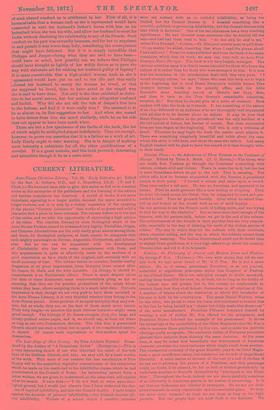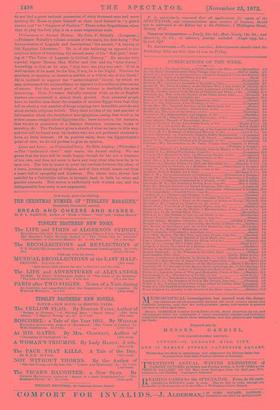Fashion : the Philosophy of Ancient and Modern Dress and
Fashion. By George P. Fox. (Triibner.)—We own with shame that till we saw this book we had never heard of Mr. G. P. Fox. He is not a mere author. He is, it seems, permanent President, or as one journal, unfaithful to republican principles, styles him Emperor of Fashion in the United States. He is not only good enough to clothe mankind, making them beautiful for over, or, at least, for so long as the frailty of the human race will permit, but in this volume ho condescends to instruct them how they shall behave themselves in all relations of life. A number of letters attest the veneration in which this benefactor of his race is held by his countrymen. The great Daniel Webster, when he was alive, was proud to wear his coats, and continued to honour him to the last by being buried in a "chaste but richly-made blue dress coat" of the same manufacture. President Fillmore honoured himself by wearing a suit of clothes Mr. Fox offered for his acceptance, and President Pierce followed the example of his predecessor. It shows the advantage of the accessibility of the Chief Magistrate that Mr. Fox is able to measure these gentlemen by the eye, and so make his patriotic offerings really acceptable. The exclusive habits of European potentates prevent their subjects from showing the same devotion. At the same time, it may be noted how beautifully one development of American character prevents the inconveniences which might result from another. The commercial economy of the great Republic pays to its Chief Magis- trate a most insufficient salary, but commerce has its side of magnificent liberality. A tailor makes no account of the cost of a suit of clothes if he can see it adorning the person of a President, and that personage could, no doubt, if he pleased, be fed as well as clothed gratuitously by I tradesmen anxious to describe themselves by "purveyors to the Presi- dent." Throughout the book, indeed, wo are made painfully conscious of an inferiority to American genius in the matter of advertising. It is not that our tradesmen are inferior in enterprise. Do we not see their advertisements in every conceivable and inconceivable place. Do they not cover even tunnels ? at least we see them as long as the light permits. But our people does not lend itself to the business. We
do not find a great national procession of sixty thousand men and more Inviting Mr. Moses to place himself at their head dressed in "a grand scarlet coat" as "Emperor of Fashion." These sober Republicans, when they do play the fool, play it on a most stupendous scale.



































 Previous page
Previous page